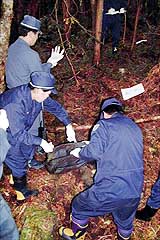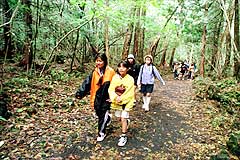|
July 15, 1999 In Japan, Mired in Recession, Suicides SoarBy STEPHANIE STROMOKYO -- In their annual sweep of the Aokigahara woods at the end of
last year, police officers found 73 bodies. There's nothing unusual
about finding bodies in Aokigahara. The lush and sprawling forest nestled
at the foot of Mount Fuji has long been one of the most popular places
in Japan for suicides. What's different now is the number: a year earlier,
the police recovered 55 bodies.
Japanese are grappling with unemployment that has risen to record levels as struggling companies slash their work forces and cut back on hiring new graduates in an effort to bring costs more in line with international standards. A total of 32,863 people committed suicide in 1998, both the largest number and the highest rate of suicide recorded since the police began keeping records in 1947. "I don't recall anything like this ever before," said Yukiko Nishihara, who has run a suicide prevention line for more than 20 years in Osaka and now Tokyo. Suicide in Japan has little of the stigma it carries in Western societies; in literature, history and even today, suicides are often portrayed as noble, a matter of conscience or an honorable form of protest. The rate of suicide in the United States in 1997 was 11.1 per 100,000, according to the latest figures from the Centers for Disease Control, compared with 19.3 per 100,000 in Japan. In recent years, though, there has been increasing criticism of suicide as irresponsible to survivors. And for years, suicide rates in Japan have been lower than those in several other industrialized countries. Statistics comparing this year's suicide rate in Japan to that in other countries do not exist. This year, however, what caused most people here to catch their breath was the increase in the number of middle-aged men who killed themselves. There was a 44.6 percent rise in suicides among men aged 40 to 59, according to the police. Japanese were also shocked by the number of young men who took their lives. Some 40 percent more men in their 20's committed suicide last year. Typically, this is a stable time in Japanese life, when young men could count on becoming "shaiin," literally members of society, by entering the work force. Now, jobs are harder to find.
"Even if you graduate from the best university, you cannot always find a job," Mrs. Nishihara said. "Young people are feeling very hopeless about their future." The largest single increase -- 53.1 percent among children 10 through 19 -- is largely ascribed to family and school-related problems and mental illness, but experts say it is hard to link those deaths to the economy. Children here have historically tended to kill themselves at a higher rate than adults, Mrs. Nishihara said, so when adult suicide rates jump, the rates among people in their teens jump even more. The shame associated with not having a job is immense, overwhelming and much understood by senior executives, who feel bullied by foreign investors and analysts pushing them to move more aggressively to cut jobs. "Of course there is a relationship between restructuring and suicide," said Atsushi Murayama, the managing director in charge of personnel at the Matsushita Electric Industrial Company and one of the few Japanese executives who has spoken openly, if reluctantly, about the problem. "Foreign analysts and the foreign press also have responsibility, too." Matsushita, like many other Japanese companies, has worked hard to avoid layoffs, a stance characterized as foot-dragging by foreigners but regarded as heroic here. "Yes, we have to be competitive with global companies, but seniority pay emphasizes security," Murayama said. "We have to adapt to free-style competition but also take consideration of the Japanese social situation." Having a job, however, apparently does not confer much of a sense of relief, either. Many men who killed themselves in the last year were employed but fearful of losing their jobs or overwhelmed by increased workloads that were a result of colleagues losing their jobs, according to experts. Wages have fallen, too, which is especially disastrous for middle-aged men, who are usually the sole earner in families struggling to shoulder the heavy burden of both mortgage payments and supplementary educational programs, standard for many Japanese children. A survey by the Bureau of Employment Security showed that of those unemployed white-collar workers in their 50's who have managed to find jobs after being laid off -- and many of them don't -- the average income is just 60 percent of what they were previously making. Financial straits, however, are not as important as the loss of face
that is a corollary to losing a job. "Certainly, there are some people
who commit suicide for financial reasons," said Hiroshi Kawahito, a
lawyer who specializes in representing the families of victims of karoshi,
literally death from overwork, and an outspoken commentator on suicide
and its causes. "But I think the most important reason is that in Japan,
if workers lose their jobs, they will be looked down upon by society."
Kawahito and a group of lawyers recently opened a one-day special telephone line that received more than 300 calls from families of karoshi and suicide victims and victims in the making. "Often companies scold the families of victims, saying the victim escaped his responsibilities and so behaved in an irresponsible manner," Kawahito said. "So in Japan, the culprit and the victim are often reversed, I think." Families of suicide victims who die by throwing themselves in front of a train are good examples of that. The Chuo line has been nicknamed the Chuo-cide in some quarters because its tracks are a favorite among suicides. JR East, the company that operates the line, charges families a fee depending on how badly traffic is disrupted. The line has reflected the overall trend in suicides. In the fiscal year that ended March 31, 33 people were killed on the line compared with 25 in the previous year. (The company calls the deaths accidents because, it says, it has no way of distinguishing the person who died as a result of suicide or one who wandered drunk onto the tracks.) Because gun ownership is severely restricted in Japan, many Japanese resort to throwing themselves in front of trains, hanging themselves, jumping off cliffs or overdosing, the police say. The suicide rate has risen every year but one since 1990, when it dropped to the lowest level since 1947. That year coincides with the burst of the economic bubble, the effect of which gradually snowballed until Japan finally slid into a tenacious recession in 1997 that only just seems to be coming to an end. But while economic distress has clearly helped increase the numbers, Shizuo Machizawa, one of Japan's few specialists in the field, suggests that the economic woes have worsened a trend that would have developed anyway. Dr. Machizawa, like many observers of Japan after World War II, believes that the suicide rate is one response to a gradual breakdown of a system that rewarded traditional Japanese values of loyalty, hierarchy and paternalism. Typically, in Japanese companies, subordinates offer their department heads absolute loyalty, and in return Japanese executives take care of their charges with an almost fatherly devotion. Now, with pressures to lay off employees, cut costs and improve efficiency, neither the boss nor the subordinate can necessarily fulfill his side of the traditional bargain. "In the past, employees could predict their career trajectory," Dr. Machizawa said. "Now, they can't." As managers are forced to lay off staff or tell older workers that younger subordinates may be making more money, the sense of shame for the bearer of bad tidings can be overwhelming." Kouji Nishigaki, the president of the NEC Corporation, which has embarked on one of the most sweeping employment cutbacks ever taken by a Japanese corporation, said, "I think Japanese managers have a great responsibility to secure employment for their work force so their lives won't fall apart," Nonetheless, a large chunk of the company's jobs cuts have come at the expense of employees in its international operations, while in Japan, a cutback in recruitment combined with early retirement will ultimately eliminate some 6,000 jobs. NEC is just one of several Japanese companies that have hired Dr. Machizawa to consult with distraught and depressed employees and conduct seminars, although, in general, psychiatric care here is limited to administering antidepressants and advising patients to try to take time off, advice that is unrealistic in an era of rising unemployment. Kawahito, the lawyer, noted that the number of people who kill themselves outnumbers the number of people who die in traffic accidents by a factor of three. "If there was an increase in traffic accidents, the Japanese Government would surely make an effort to reduce the number," he said. "But the suicide rate keeps going up and we have no Government policy." In Aokigahara, several local groups have banded together with the police to fight suicide in the forest. They have nailed signs on trees along several of the paths leading into the woods, imploring potential suicide victims to think again. "Life is a precious present from your parents," the signs say. "Think quietly about your parents, brothers and sisters and children. Do not agonize alone, please consult us first." The telephone number for the Fujiyoshida Police Precinct follows. The police patrol the area looking for likely suicide victims and
pick up about one person a day on average, a precinct spokesman said.
"For instance, if someone is wearing a suit, we certainly stop the car
and take them into custody," he said. |



